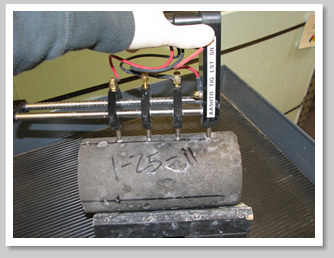
The durability of concrete materials is largely governed by the quality of the microstructure. Electrical methods show great promise in helping to understand and quantify this microstructure. The most popular of these methods has traditionally been the Rapid Chloride Penetrability Test, ASTM C1202, which is typically considered an empirical test. The downsides of this are relatively long sample preparation time, typically considered 8 man-hours, the high equipment costs, upwards of $ 10,000, and the destructive nature of the test.
Work at Purdue has looked at very rapid electrical measurements that can be done in less than one minute per sample, and require little to no sample preparation. These methods are non-destructive, which allow them to completely characterize a mixture at many different ages using as little as three samples. These methods can also be directly related to many physical parameters, which can lead to limits of performance that are based on scientific data as opposed to empirical relationships.